Cornelis de Heem Painting Reproductions 1 of 1
1631-1695
Dutch Baroque Painter
Cornelis de Heem, born in 1631 in Leiden, belonged to one of the great dynasties of still-life painters, a family where talent seemed to flow as naturally as paint from a brush. His father, Jan Davidszoon de Heem, was one of the towering figures of the genre, a master who redefined still-life painting in the 17th century with his lavish depictions of flowers, fruit, and opulent banquet tables. Cornelis followed closely in his father’s footsteps, absorbing this extraordinary legacy and contributing his own distinct touch to the family’s artistic tradition.
Baptised in Leiden but raised in Antwerp from a young age, Cornelis was deeply embedded in the vibrant artistic community of the Southern Netherlands. It was in Antwerp where he honed his craft under his father's guidance, but it was also a city teeming with influences from both the Dutch Republic and the Flemish Baroque. This fusion of styles is evident in Cornelis’s work, where the sumptuous, almost decadent arrangements of the Flemish tradition meet the more restrained precision of Dutch still-life painting. Cornelis’s ability to move between these artistic worlds was a reflection of the broader fluidity of the time, as the Low Countries were negotiating their cultural and political identities after the Peace of Westphalia.
Although Cornelis was trained by his father and his style was often indistinguishable from that of his relatives - his brother, nephew, and son all worked within the same genre - his works stand out for their subtle differences. He had a particular fondness for strong blues, a color that appears repeatedly in his compositions, giving his paintings a cool, serene quality that contrasts with the warm, rich tones favored by his father. Cornelis’s works are also generally smaller and more intimate, as though designed for personal contemplation rather than public display.
Over time, Cornelis’s style became more distinct from his father’s. While Jan Davidszoon embraced a more painterly, textured approach, Cornelis’s later works are marked by a certain clarity and precision that hints at the emerging tastes of the late 17th century. His compositions of flowers and fruit, meticulously arranged and bathed in soft, natural light, exude a sense of calm order amidst the abundance. His ability to evoke both abundance and restraint in a single painting is what makes his work so compelling.
Cornelis moved frequently, from Antwerp to Utrecht, The Hague, and back again, reflecting both the mobility of artists during this period and the interconnectedness of the artistic centers of the Low Countries. His career, though overshadowed by his father’s monumental reputation, left a lasting mark on the still-life tradition. Cornelis de Heem died in 1695 in Antwerp, his works now held in some of the world’s most prestigious museums, including the Rijksmuseum in Amsterdam and the Kunsthistorisches Museum in Vienna. Though often confused with those of his family, his paintings possess a quiet elegance and refinement that distinguish him as a master in his own right.
Baptised in Leiden but raised in Antwerp from a young age, Cornelis was deeply embedded in the vibrant artistic community of the Southern Netherlands. It was in Antwerp where he honed his craft under his father's guidance, but it was also a city teeming with influences from both the Dutch Republic and the Flemish Baroque. This fusion of styles is evident in Cornelis’s work, where the sumptuous, almost decadent arrangements of the Flemish tradition meet the more restrained precision of Dutch still-life painting. Cornelis’s ability to move between these artistic worlds was a reflection of the broader fluidity of the time, as the Low Countries were negotiating their cultural and political identities after the Peace of Westphalia.
Although Cornelis was trained by his father and his style was often indistinguishable from that of his relatives - his brother, nephew, and son all worked within the same genre - his works stand out for their subtle differences. He had a particular fondness for strong blues, a color that appears repeatedly in his compositions, giving his paintings a cool, serene quality that contrasts with the warm, rich tones favored by his father. Cornelis’s works are also generally smaller and more intimate, as though designed for personal contemplation rather than public display.
Over time, Cornelis’s style became more distinct from his father’s. While Jan Davidszoon embraced a more painterly, textured approach, Cornelis’s later works are marked by a certain clarity and precision that hints at the emerging tastes of the late 17th century. His compositions of flowers and fruit, meticulously arranged and bathed in soft, natural light, exude a sense of calm order amidst the abundance. His ability to evoke both abundance and restraint in a single painting is what makes his work so compelling.
Cornelis moved frequently, from Antwerp to Utrecht, The Hague, and back again, reflecting both the mobility of artists during this period and the interconnectedness of the artistic centers of the Low Countries. His career, though overshadowed by his father’s monumental reputation, left a lasting mark on the still-life tradition. Cornelis de Heem died in 1695 in Antwerp, his works now held in some of the world’s most prestigious museums, including the Rijksmuseum in Amsterdam and the Kunsthistorisches Museum in Vienna. Though often confused with those of his family, his paintings possess a quiet elegance and refinement that distinguish him as a master in his own right.
6 Cornelis de Heem Paintings
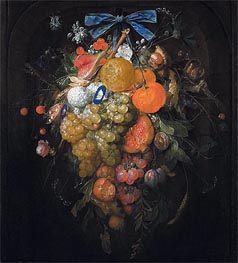
Festoon with Fruits and Flowers n.d.
Oil Painting
$2945
$2945
Canvas Print
$56.39
$56.39
SKU: HEC-9126
Cornelis de Heem
Original Size: 58 x 52.2 cm
Staatliche Museum, Schwerin, Germany
Cornelis de Heem
Original Size: 58 x 52.2 cm
Staatliche Museum, Schwerin, Germany
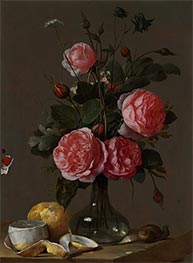
Floral Still Life c.1670/90
Oil Painting
$1478
$1478
Canvas Print
$56.39
$56.39
SKU: HEC-17608
Cornelis de Heem
Original Size: 37 x 27 cm
Minneapolis Institute of Arts, Minnesota, USA
Cornelis de Heem
Original Size: 37 x 27 cm
Minneapolis Institute of Arts, Minnesota, USA
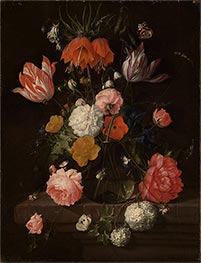
Bouquet 1660s
Oil Painting
$2693
$2693
Canvas Print
$65.27
$65.27
SKU: HEC-18893
Cornelis de Heem
Original Size: 58.8 x 44.8 cm
Staatliche Kunsthalle, Karlsruhe, Germany
Cornelis de Heem
Original Size: 58.8 x 44.8 cm
Staatliche Kunsthalle, Karlsruhe, Germany
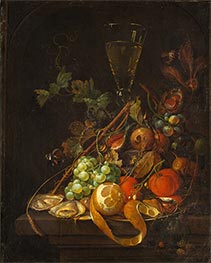
Still Life with Fruits n.d.
Oil Painting
$2629
$2629
Canvas Print
$68.37
$68.37
SKU: HEC-18975
Cornelis de Heem
Original Size: 64.5 x 51.5 cm
Fuji Art Museum, Tokyo, Japan
Cornelis de Heem
Original Size: 64.5 x 51.5 cm
Fuji Art Museum, Tokyo, Japan
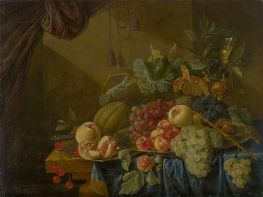
Fruit Still Life c.1660
Oil Painting
$3301
$3301
Canvas Print
$64.18
$64.18
SKU: HEC-19775
Cornelis de Heem
Original Size: 57.7 x 76.8 cm
Museum der Bildenden Kunste, Leipzig, Germany
Cornelis de Heem
Original Size: 57.7 x 76.8 cm
Museum der Bildenden Kunste, Leipzig, Germany

Flowers and Still Life c.1650/60
Oil Painting
$2721
$2721
Canvas Print
$62.31
$62.31
SKU: HEC-19899
Cornelis de Heem
Original Size: 53.3 x 73.8 cm
Fitzwilliam Museum, Cambridge, UK
Cornelis de Heem
Original Size: 53.3 x 73.8 cm
Fitzwilliam Museum, Cambridge, UK